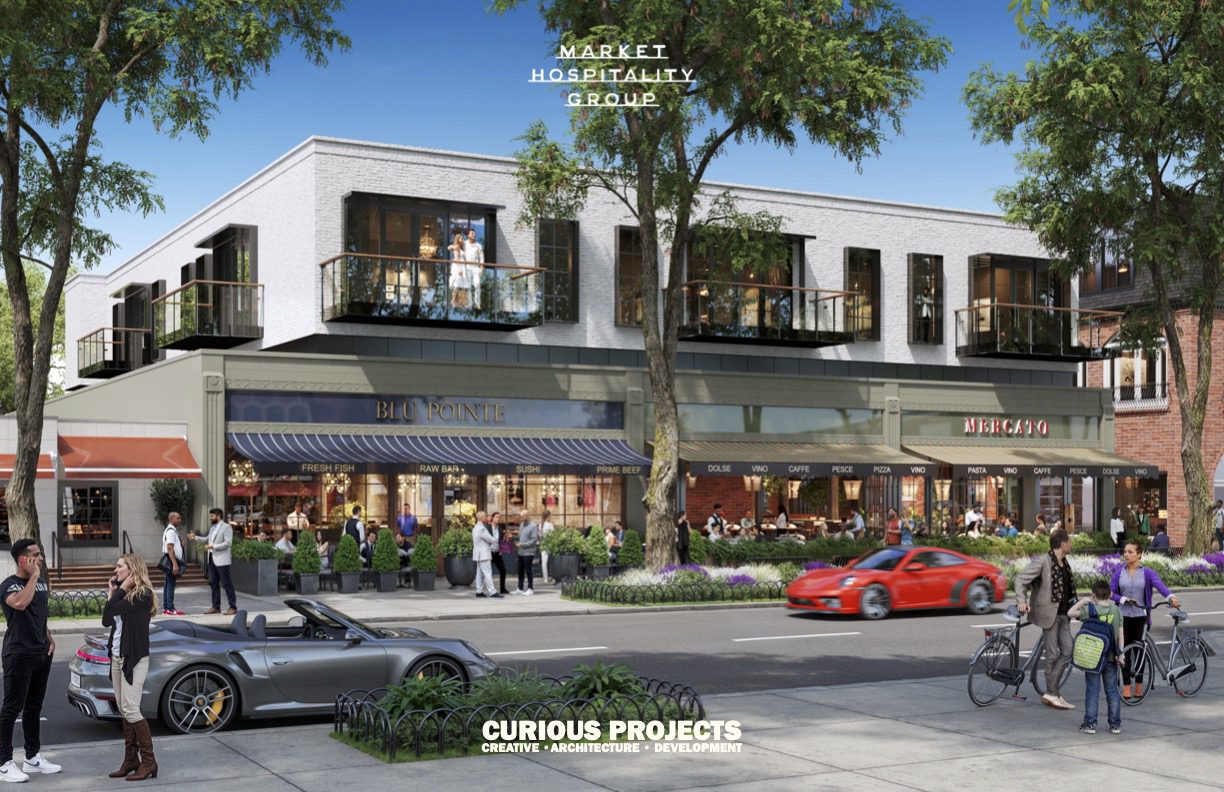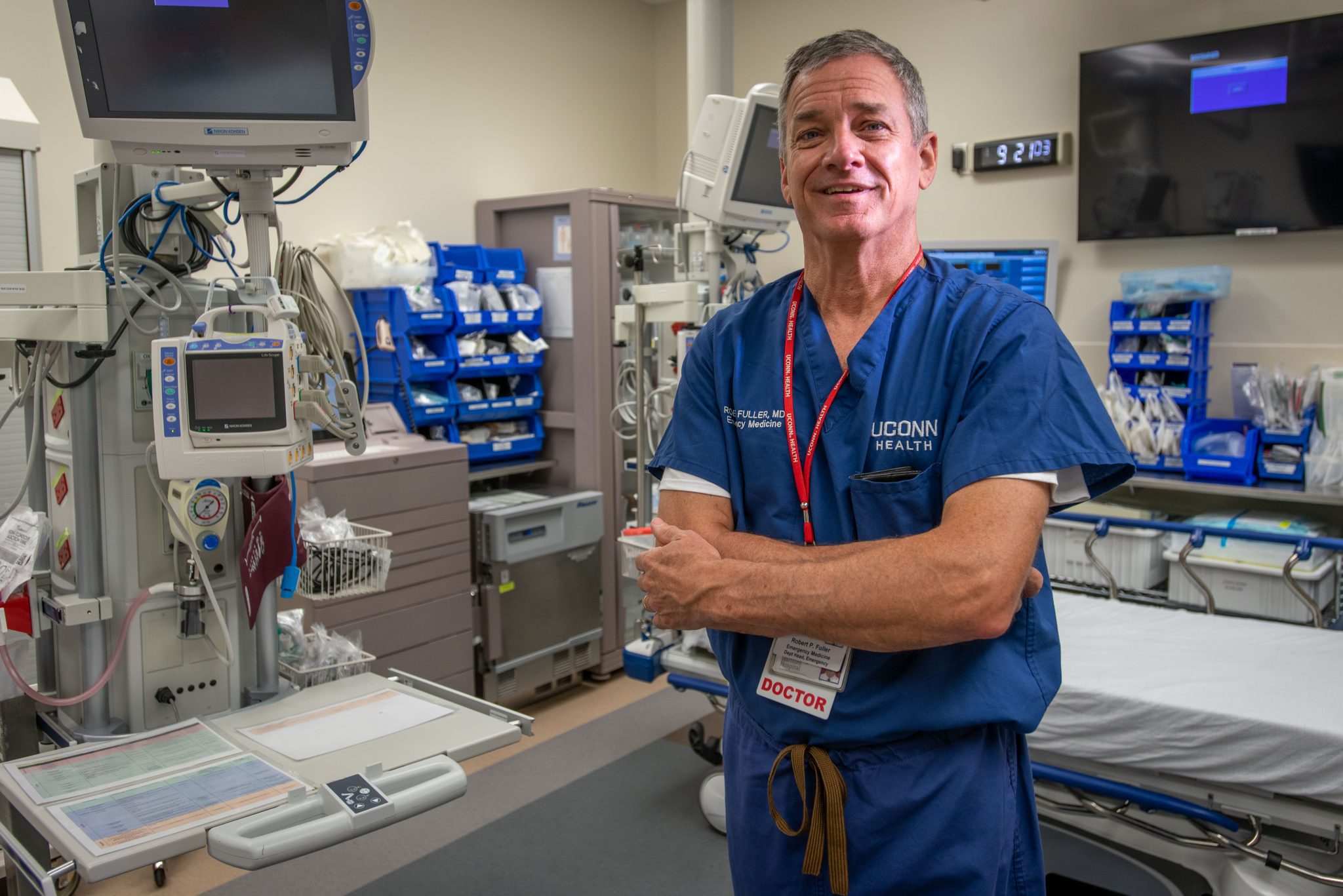‘We Can All Do Small Things in a Great Way’: West Hartford MLK Day Event Speakers Advocate for Public Service

Audio By Carbonatix
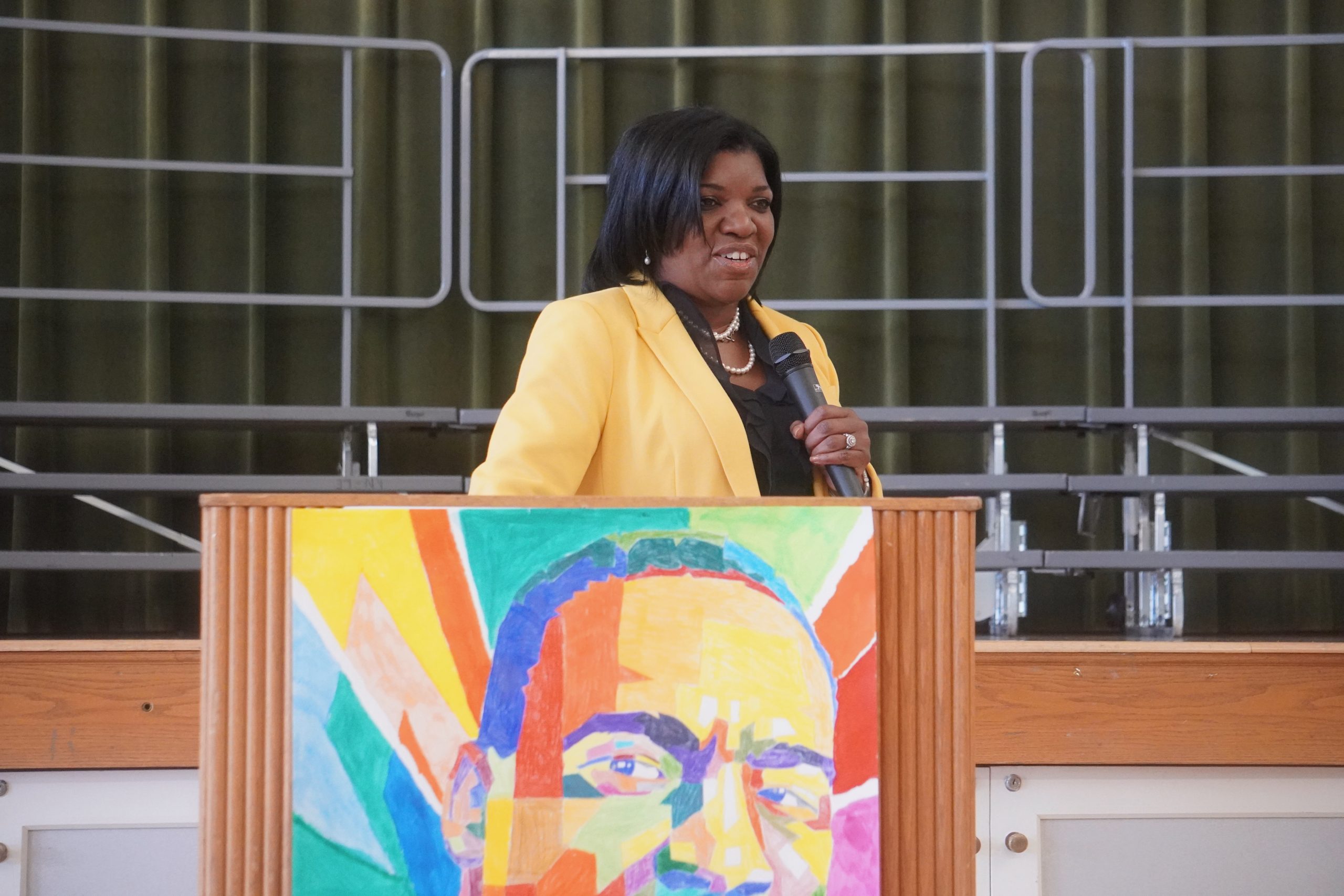
Vannessa Dorantes, commissioner of the Department of Children and Families, was the keynote speaker at West Hartford's 27th celebration of Martin Luther King Day. Jan. 16, 2023. Photo credit: Ronni Newton
The theme of West Hartford’s 27th annual Martin Luther King Day celebration was ‘Public Service,’ and speakers delivered messages about dismantling racism, working together as a community, and understanding that small things matter.
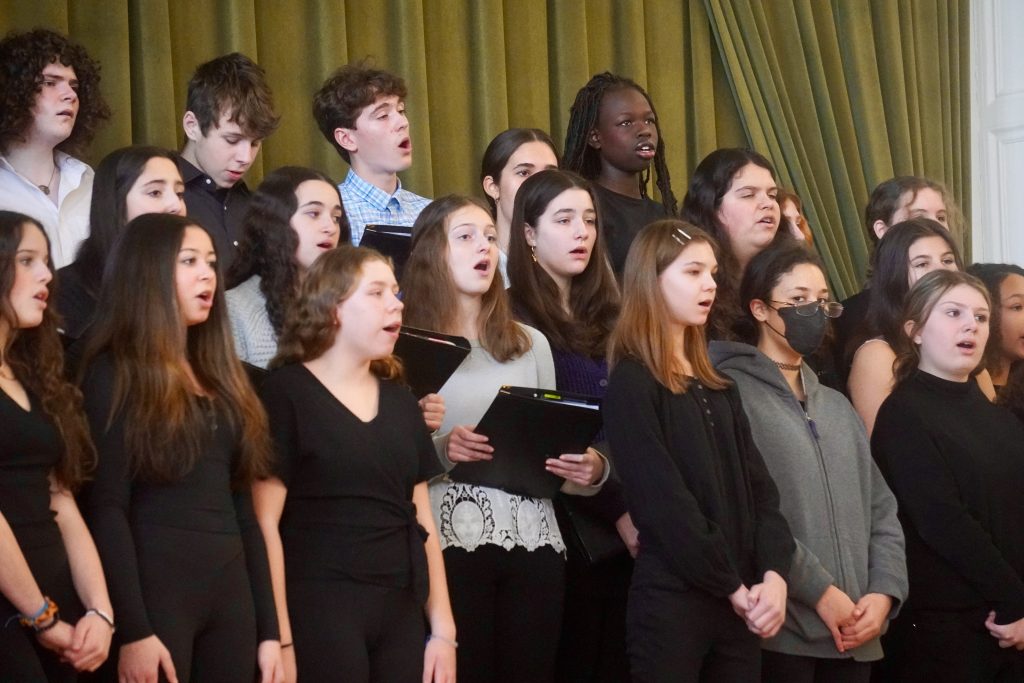
A combined group of the Hall Choraliers and the King Philip Middle School Singers led the singing of “We Shall Overcome.” West Hartford 27th celebration of Martin Luther King Day. Jan. 16, 2023. Photo credit: Ronni Newton
By Ronni Newton
A standing-room-only crowd at West Hartford Town Hall on Monday morning gave tribute to the work and life of Dr. Martin Luther King Jr. with speakers delivering messages about public service and urging the community not to forget that small actions matter.
“We all can’t do great things, but we all can do small things in a great way,” Vannessa Dorantes, commissioner of Connecticut’s Department of Children and Families and the event’s keynote speaker, told the crowd.
Dorantes, who has been in her role since 2019 and has been with DCF since 2002, was introduced by state Rep. Tammy Exum, representing the West Hartford African American Social & Cultural Organization.
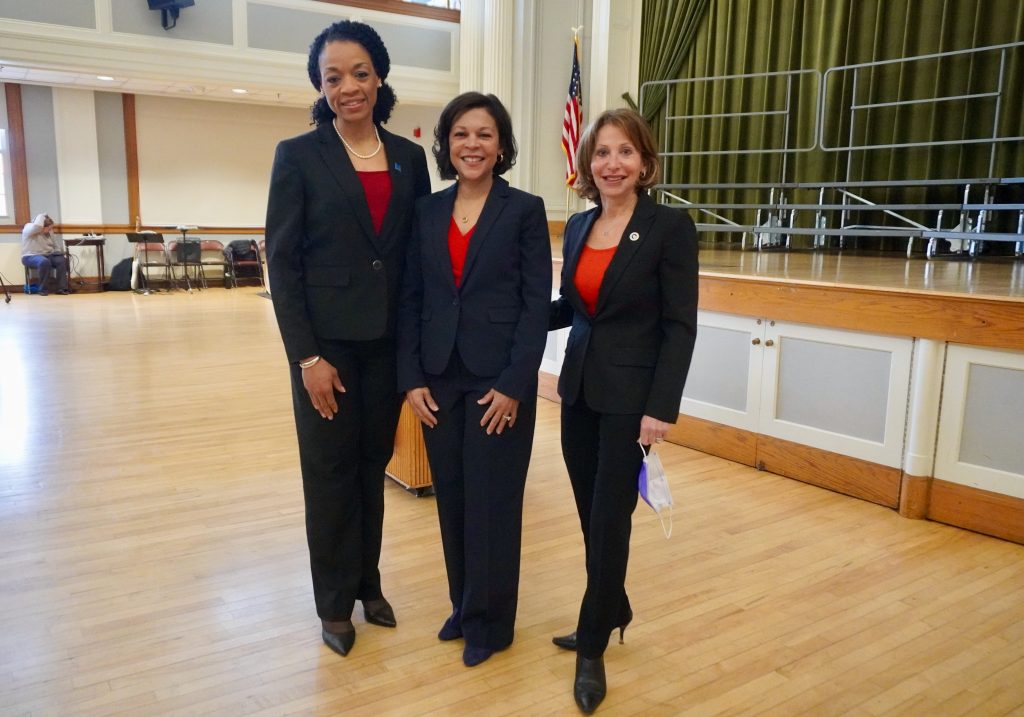
From left: Lorna Thomas- Farquharson, Tammy Exum, Shari Cantor. West Hartford 27th celebration of Martin Luther King Day. Jan. 16, 2023. Photo credit: Ronni Newton
As the first African American to lead DCF, Dorantes said, “being the first means absolutely nothing unless you pave the way for the next up,” noting the student speakers are examples of what is possible.
West Hartford itself a shining example of what’s possible, too, she said, noting that Board of Education Chair Lorna Thomas-Farquharson, Police Chief Vernon Riddick, and Exum are all persons of color, and others from the community have been trailblazers in many ways.
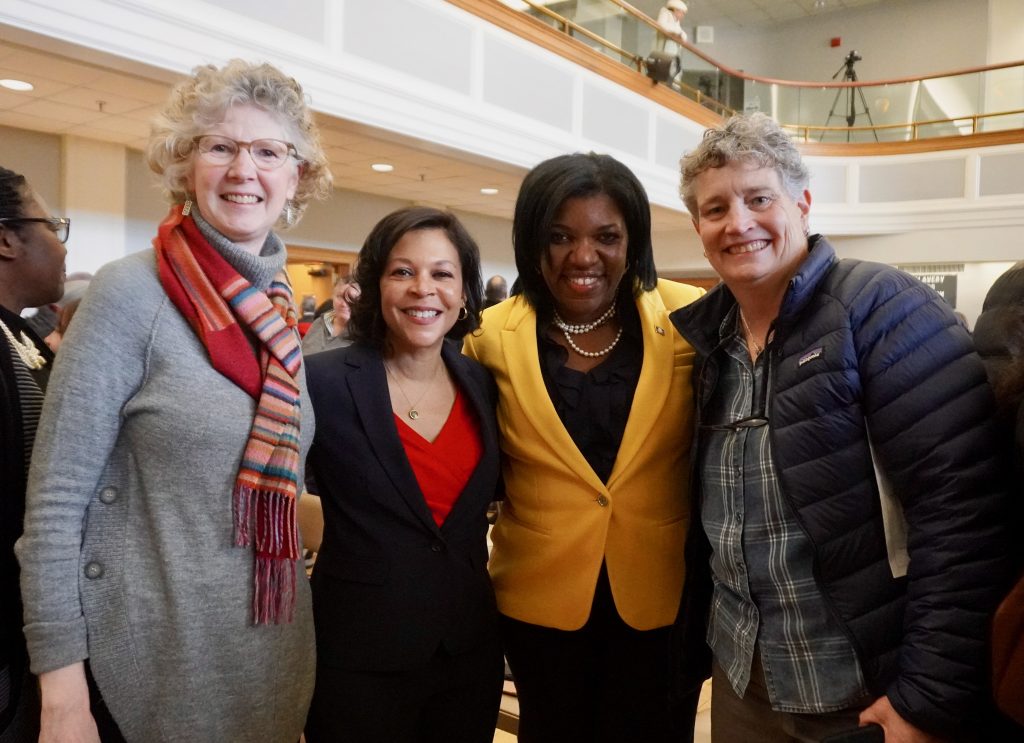
From left: Commissioner of Social Services Dr. Deidre Gifford, State Rep. Tammy Exum, Commissioner of DCF Vannessa Dorantes, Commissioner of the Office of Early Childhood Beth Bye. West Hartford 27th celebration of Martin Luther King Day. Jan. 16, 2023. Photo credit: Ronni Newton
“So what would King think if he were driving through West Hartford?” she asked. She said she thinks he would be pleased.
“I think West Hartford is a shining example of what’s possible when we see people for people, when we recognize the importance of all people,” Dorantes said.
“Martin Luther King Day is the only federal holiday designated as a national day of service to encourage all Americans to volunteer to improve their communities so think of this as a day on, not a day off, because you are all here today,” she said.
It’s a great day to think about how to serve others, and she challenged the community to think about what they can commit to doing by this time next year, whether it’s serving at a soup kitchen or visiting the elderly. “Imagine if everyone in the room did one small thing great. … Think how much greater our community could be.”
Dorantes has risen through the ranks of DCF since joining the agency in 1992, and when Gov. Ned Lamont was elected and began a national search for a DCF commissioner, she had urged members of the department not to lose the momentum they had been building, and committed herself to working with and supporting whomever was appointed.
“The next thing I knew, a few weeks later my phone rang from a number that I did not recognize,” she said, thinking it was her daughter, who was at a sleepover, calling from a friend’s phone. It was Lamont, asking her to be the commissioner.
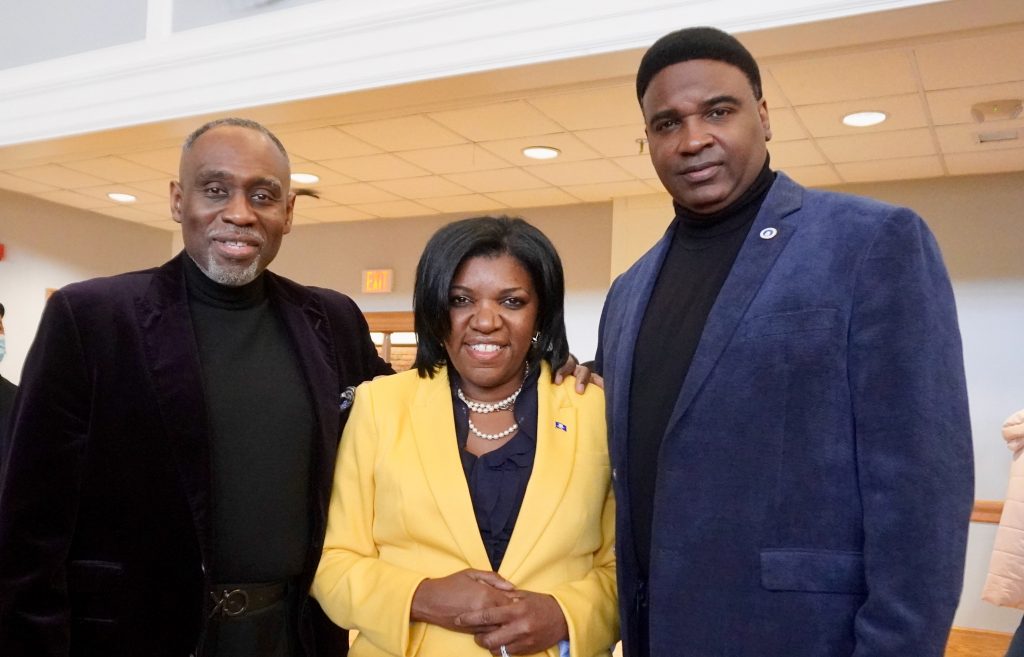
West Hartford 27th celebration of Martin Luther King Day. Jan. 16, 2023. Photo credit: Ronni Newton
“A lesson for the students here today is the concept of ‘imposter syndrome,'” she said – that little voice that makes you doubt yourself and your capabilities. But she realized, with the help and support of her husband, “I understood that the call to serve is bigger than any individual doubt,” and she recalled King’s statement that “the time is always right to do what’s right.”
To the students, Dorantes said, “Everything you do today is preparation for what you are to be. Every triumph, every mistake, every victory, every challenge, are all pieces of the puzzle of you.”
Dorantes is proud of what DCF has accomplished. She joined DCF as a caseworker when the agency was looking to lower case loads, as required by the Juan F. Consent Decree – and never thought she would be in the commissioner’s seat when the state successfully exited from federal oversight after 11,672 days. The disparity index – the difference between outcomes for white children compared to children of color – has been greatly reduced, she said, “but we still have work to do.”
This is no time for complacency, she said. “We all help each other and still do every single day. … This is a time for vigorous and positive action.”
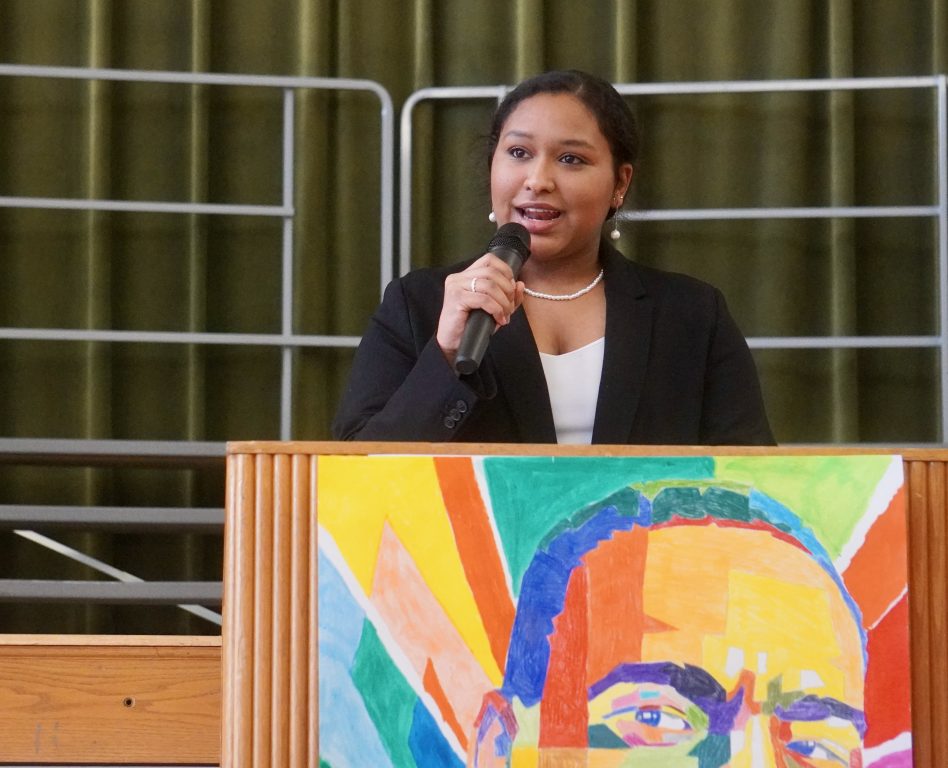
Conard student speaker Afaf Albur. West Hartford 27th celebration of Martin Luther King Day. Jan. 16, 2023. Photo credit: Ronni Newton
The Conard High School student perspective was provided by senior Afaf Albur.
“I remember the first time I was told that systemic racism does not exist,” she said. “I have a vivid memory of one of the early days during quarantine when I was having a debate in the comment section of TikTok with people I don’t know. I don’t exactly remember what the video was about, but I remember everyone was just debating with each other and making conversation. But then, one person replied to my comment and claimed that systemic racism doesn’t exist, and that the only form of racism that exists is individual racism.”
Albur was a high school freshman at the time, and said as a member of an immigrant family and as a person of color, she had always known that racism existed, that her family had struggled due to systemic issues.
“Systemic racism refers to the ways in which racial prejudice is built into the policies and practices of institutions, resulting in unequal outcomes for different racial groups. It is often invisible and may be perpetuated unconsciously and I guess that makes it difficult for people who are not directly affected by it to recognize and understand its effects,” she said.
“Even after these institutions [of slavery and segregation] were abolished, people of color have continued to face discrimination and disadvantage in many areas of society, including the criminal justice system, education, housing, wealth gap, employment, government surveillance, incarceration, drug arrests, immigration arrests, and I could keep going,” Albur said. “These systems are no longer invisible and the ongoing discrimination that people of color face cannot be denied.”
Public service – the theme of these year’s Martin Luther King Day celebration – is creating positive change, and practicing anti-racism is one way of doing that, she said, “making conscious, unbiased decisions in our daily lives to work towards creating a more equal society” by dismantling long-standing systems and replacing them with ones that are more equitable.
Albur called on those who identify as white to acknowledge their privilege, “working to change internalized racism, and actively speaking out against racism when they witness it.” People of color, she said, can acknowledge and challenge internalized racism, “as well as working to address racism directed towards other racial groups.”
Individuals have more impact than they think they do, Albur said. “If everyone here today committed to practicing antiracism in their daily lives, we could bring about significant change in our community because each individual has the power to influence the people around them, and when everyone works towards antiracism, the collective impact is what is so significant.”
Exercising the right to vote, she said, is another form of public service that greatly impacts the community.
“It may be a complex and difficult process but by actively choosing to be anti racist and doing our part as citizens and as human beings, we can work towards creating real change,” Albur said. “That change may not come tomorrow, or next month, or next year but I am optimistic that it will happen one day because I see hope in our future. I see in you, the power of change.”
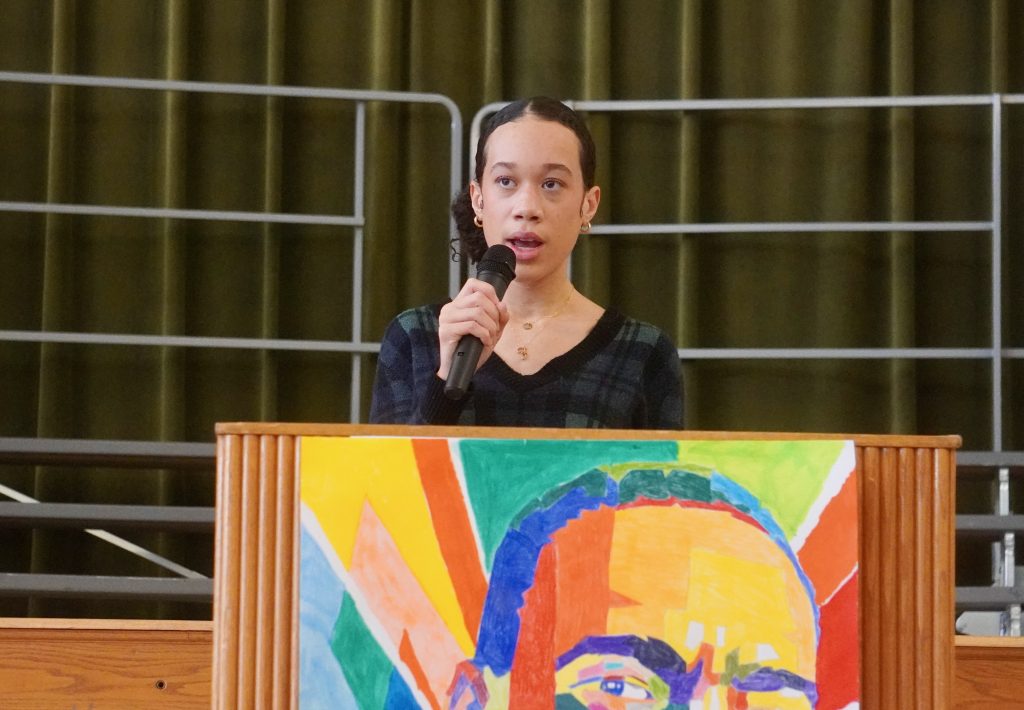
Hall student speaker Zella Jackson. West Hartford 27th celebration of Martin Luther King Day. Jan. 16, 2023. Photo credit: Ronni Newton
Zella Jackson provided the student perspective from Hall, and spoke of King’s vision for a beloved community, his dream of people working together to better the lives of themselves and others. Even the smallest actions in the West Hartford community can embody King’s ideals, she said.
“What King did in his lifetime inspires us to strive to help others in our own ways,” Jackson said. “He motivates us to look within our community and come together, no matter our backgrounds and differences. Through the act of community service we are able to gain a better understanding of those around us. We improve ourselves by exposing ourselves to different individuals.”
Public service and volunteering allows the community to grow through teamwork. “We are stronger than one individual person,” she said, and that’s crucial “to freedom, equity, and change. Without the help of others in our community and working together to help everyone, without the ability to come together and do things that don’t just benefit us individually, we as a community can never truly succeed as a whole.”
Jackson called on the community to embody Martin Luther King’s ideals. “I am seeking to rise to the challenge by continuing to give back to the community … I believe that we can all make a difference, like King, with compassion and understanding. Look within yourself, look within your community, and find what you believe matters, what you are passionate about, what you believe you can make a difference in. … Everybody can be great, because everybody can serve.”
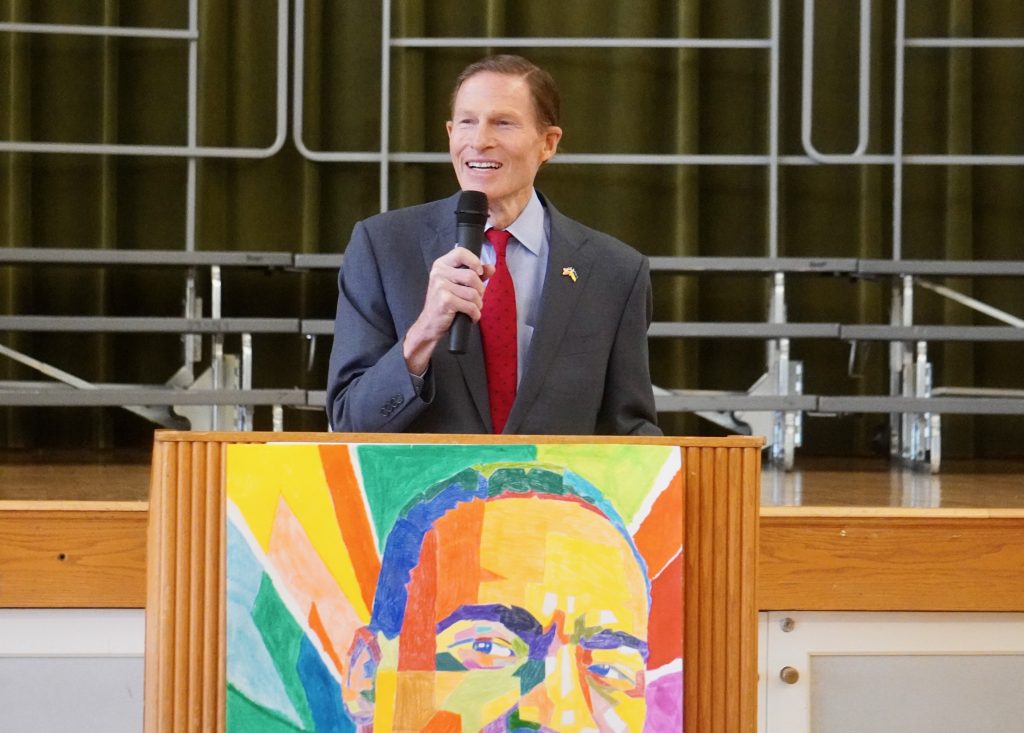
U.S. Sen. Richard Blumenthal. West Hartford 27th celebration of Martin Luther King Day. Jan. 16, 2023. Photo credit: Ronni Newton
U.S. Sen. Richard Blumenthal also addressed the crowd in the Town Hall auditorium. “It’s not a day off, it’s really a day on,” he said of the celebration of the life of Dr. Martin Luther King. “It’s a day on in the fight for social justice, economic justice, environmental justice.” It’s now more urgent than ever, he said.
Blumenthal noted that one of King’s final acts before his assassination was championing economic justice for the sanitation workers in Memphis advocating for them, because as important as it was to desegregate one town, to have a seat at the lunch counter you need the money to buy lunch, and you need a job to have the need to take the bus.
“These causes remain with us today as vibrant and important as ever, and you being here sends a really powerful message,” he said.
Blumenthal said that one of the most moving moments of his life was championing the nomination of the first African American woman to be on the United States Supreme Court. “At the moment that her confirmation was announced, the galleries were full, they were full with people of all races, all religions, all economic backgrounds … who could see in her a role model for them, and the galleries erupted with applause. That moment was America. That moment was the America of Martin Luther King.”
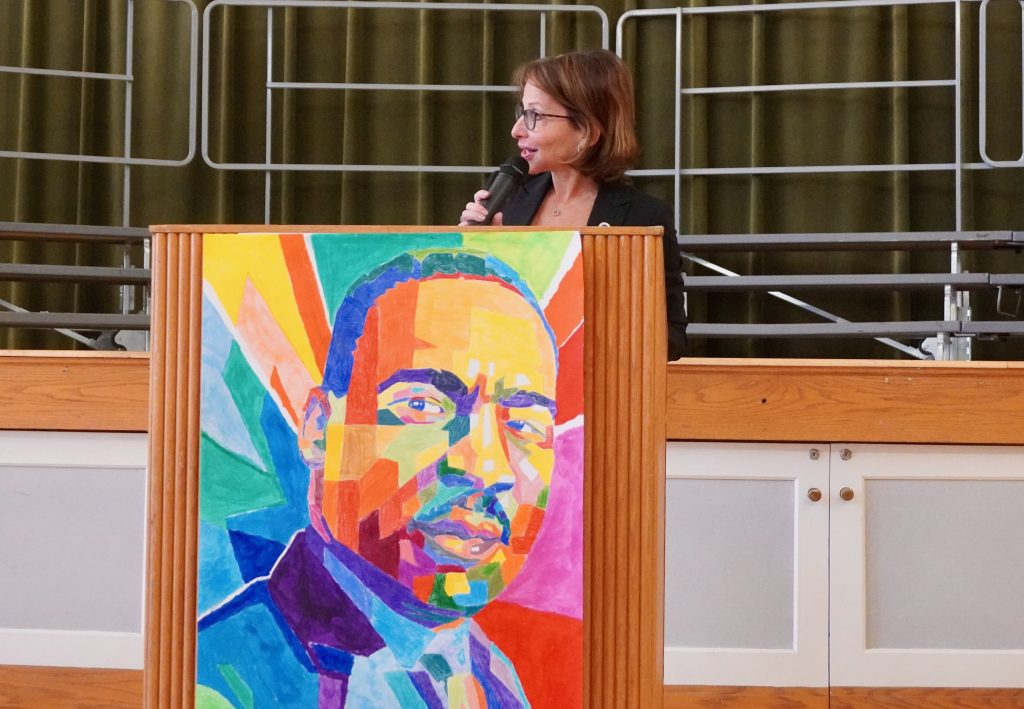
Mayor Shari Cantor welcomed attendees at West Hartford’s 27th celebration of Martin Luther King Day. Jan. 16, 2023. Photo credit: Ronni Newton
“I am always moved and learn so much from all of the comments and the shared wisdom of the people in this program,” said Mayor Shari Cantor, who welcomed the audience to the annual celebration. She noted that a subgroup of the Mayor’s Youth Council is developing a walking tour of historic sites in West Hartford Center “that will open your eyes to the history of slavery right here in our town.” Mayor’s Youth Council members had a table in the back of the room, and handed out information on the tour which features seven sites – including the newly-installed Lemuel Haynes plaque and Dinah Road street sign, Witness Stone markers at Old Center Cemetery, Unity Green, and the MLK mural.
Local residents have embraced the public service about which King preached, Cantor said. “Every day in West Hartford I am reminded that our community comprises individuals who are willing to volunteer in many capacities including serving on our boards and commissions, Town Council, Board of Education, PTOs and sports leagues, as well as assist our social services clients by providing a ride or stopping by as a friendly visitor, stocking the shelves of our Food Pantry, helping at our vaccine clinics, volunteering as a CERT member, and organizing special events and projects that enhance the quality of life of West Hartford. On behalf of the Town Council, I am truly grateful.”
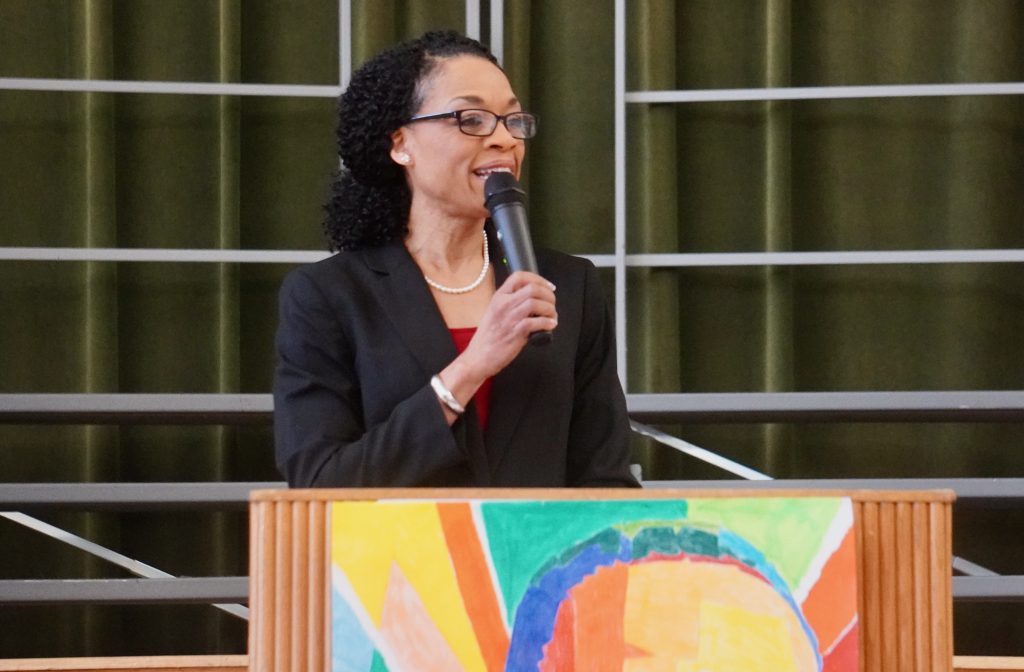
Board of Education Chair Lorna Thomas-Farquharson was emcee. West Hartford 27th celebration of Martin Luther King Day. Jan. 16, 2023. Photo credit: Ronni Newton
Board of Education Chair Lorna Thomas-Farquharson, who works as a program manager at Connecticut’s Office of Early Childhood, served as emcee of the event.
“I am so happy we can finally be together, in-person, after two years apart thanks to the coronavirus,” she said.
Thomas-Farquharson noted that the nation and the community has come together for hope and healing following the recent traumatic injury to Buffalo Bills player Damar Hamlin, and more locally, the fatal crash that took the life of former state Rep. Quentin “Q” Williams of Middletown, both Black men. “We saw our community come together, our state come together and beyond … you heard people talk about them with respect and affection for who they are as human beings,” she said, focused on their character, not the color of their skin.
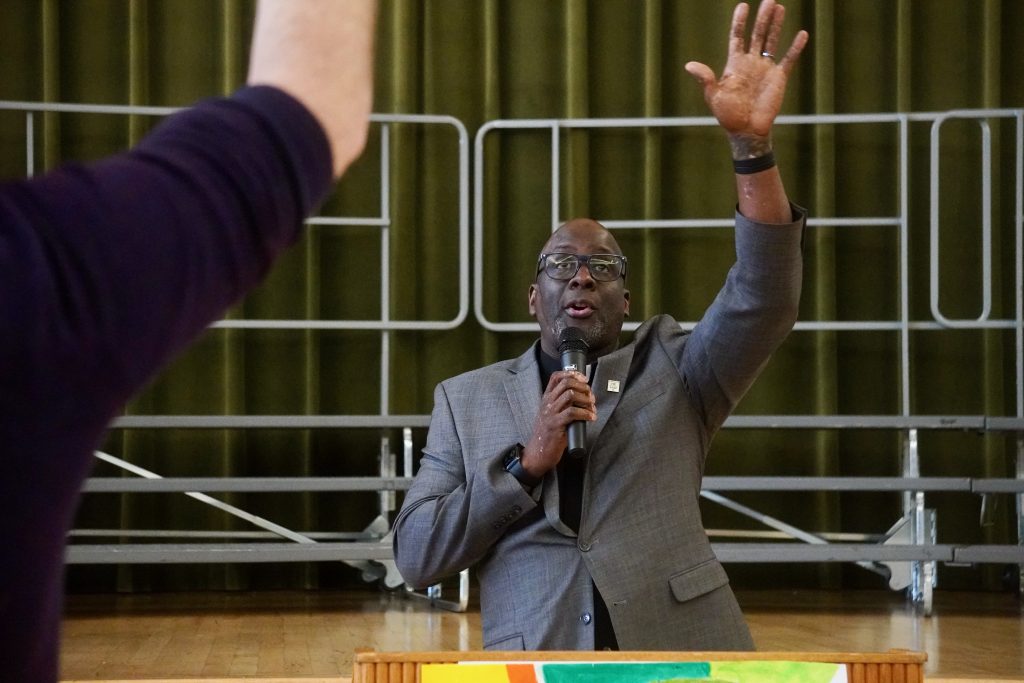
Rev. Fredd Ward of First Church West Hartford delivered the invocation. West Hartford 27th celebration of Martin Luther King Day. Jan. 16, 2023. Photo credit: Ronni Newton
Rev. Fredd Ward, associate minister of First Church West Hartford, delivered the invocation. He engaged the audience not just in prayerful contemplation, but had them repeat after him the word “everybody” – noting that “everybody can serve.” He asked the audience to pray for grace and love, to reach up high for grace and love, to hold it in their hands, and to extend their hands to share it with others.
The Conard Jazz Combo provided music both before and after the formal part of the program. The King Philip Middle School Singers performed “The Dream Keeper,” Hall High School’s Choraliers performed “Don’t Worry About Me” and “Lift Ev’ry Voice and Sing,” and both choirs led the audience in a rousing sing-along of “We Shall Overcome” to close out the celebration.
More background about the speakers can be found here.
The entire celebration can be viewed by clicking on the West Hartford Community Interactive YouTube video below.
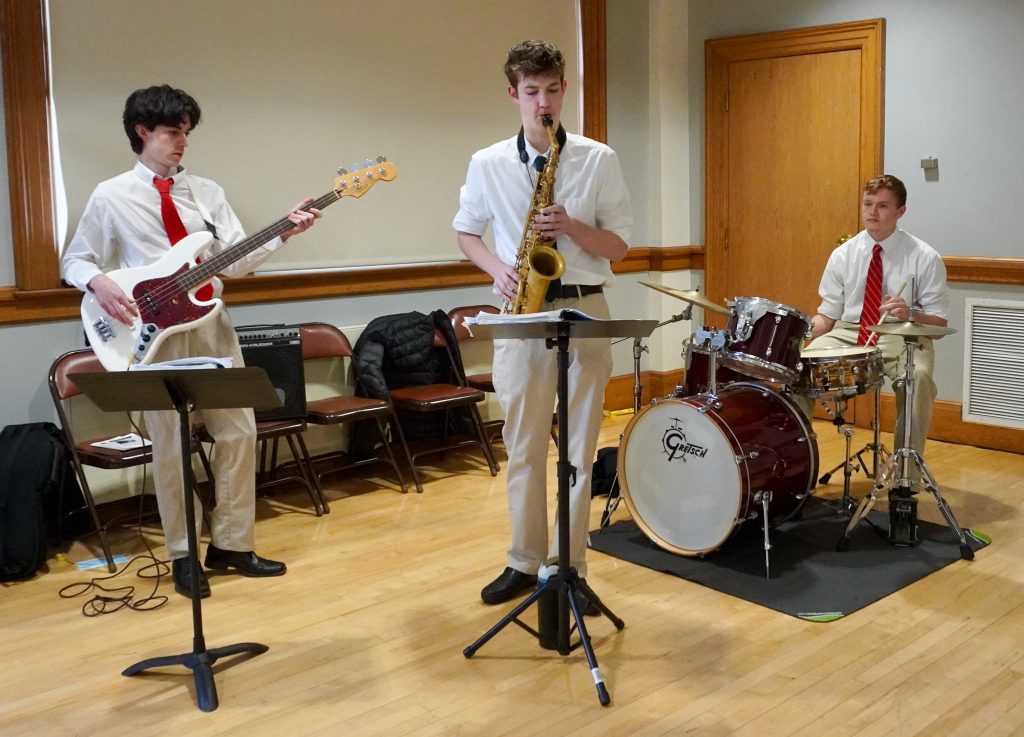
Conard Jazz Combo. West Hartford 27th celebration of Martin Luther King Day. Jan. 16, 2023. Photo credit: Ronni Newton
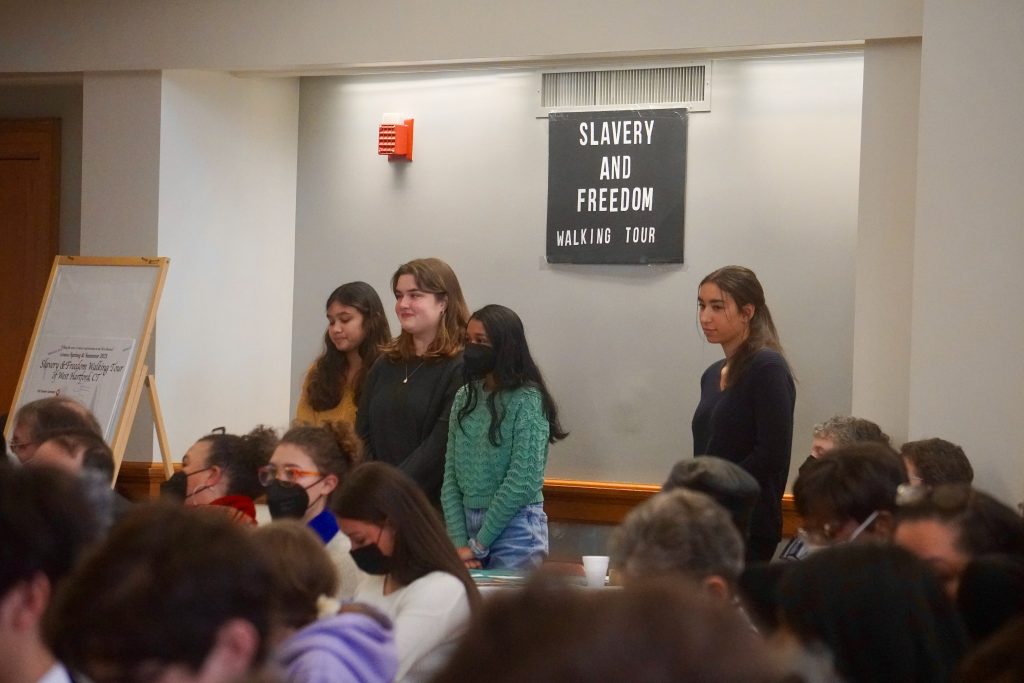
A group of students representing the Mayor’s Youth Council have created a ‘Slavery and Freedom’ walking tour. West Hartford 27th celebration of Martin Luther King Day. Jan. 16, 2023. Photo credit: Ronni Newton
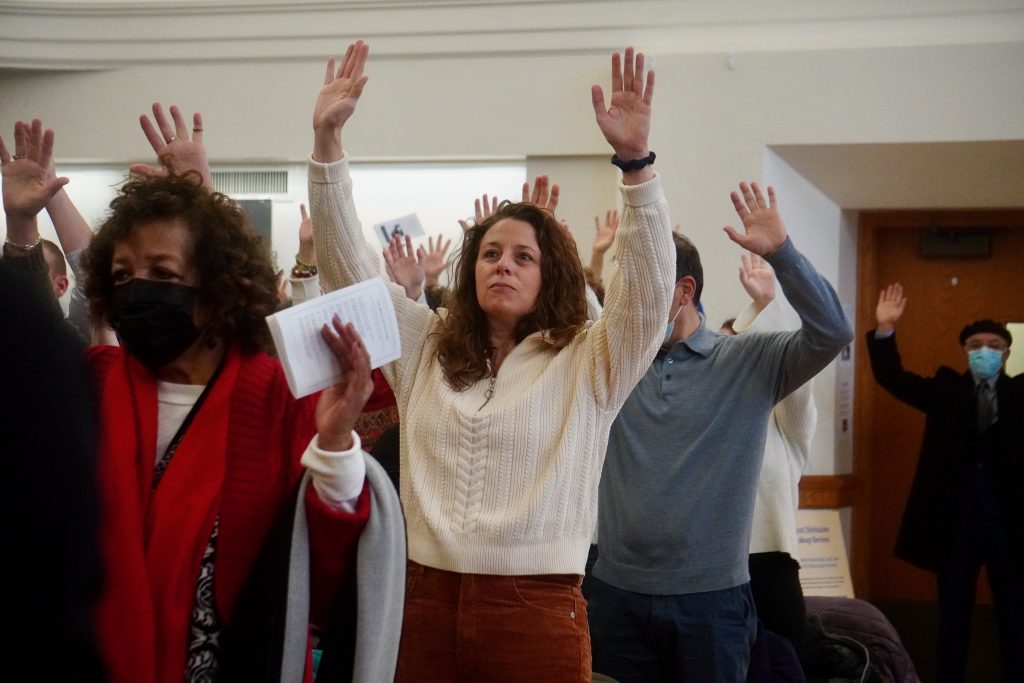
West Hartford 27th celebration of Martin Luther King Day. Jan. 16, 2023. Photo credit: Ronni Newton
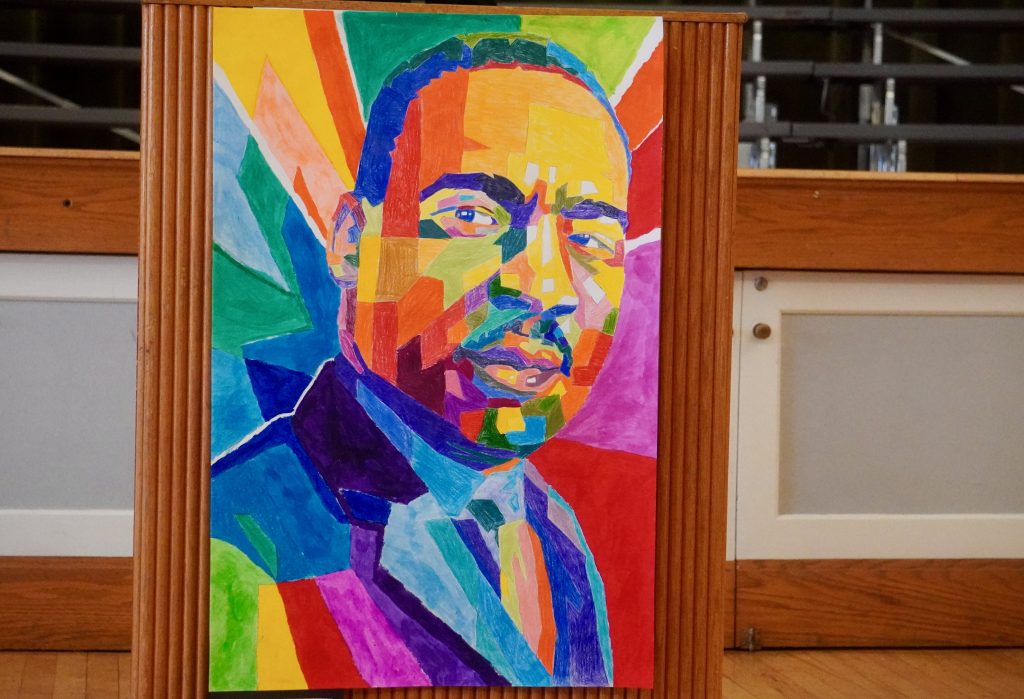
Aiken Elementary School students created the image of Martin Luther King Junior. Photo credit: Ronni Newton
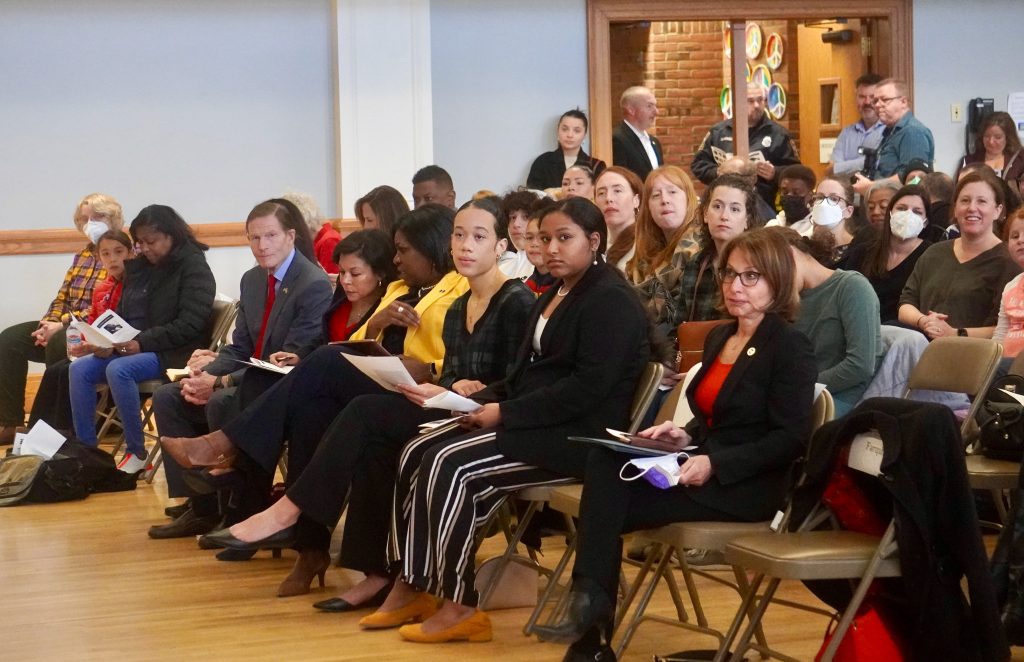
West Hartford 27th celebration of Martin Luther King Day. Jan. 16, 2023. Photo credit: Ronni Newton
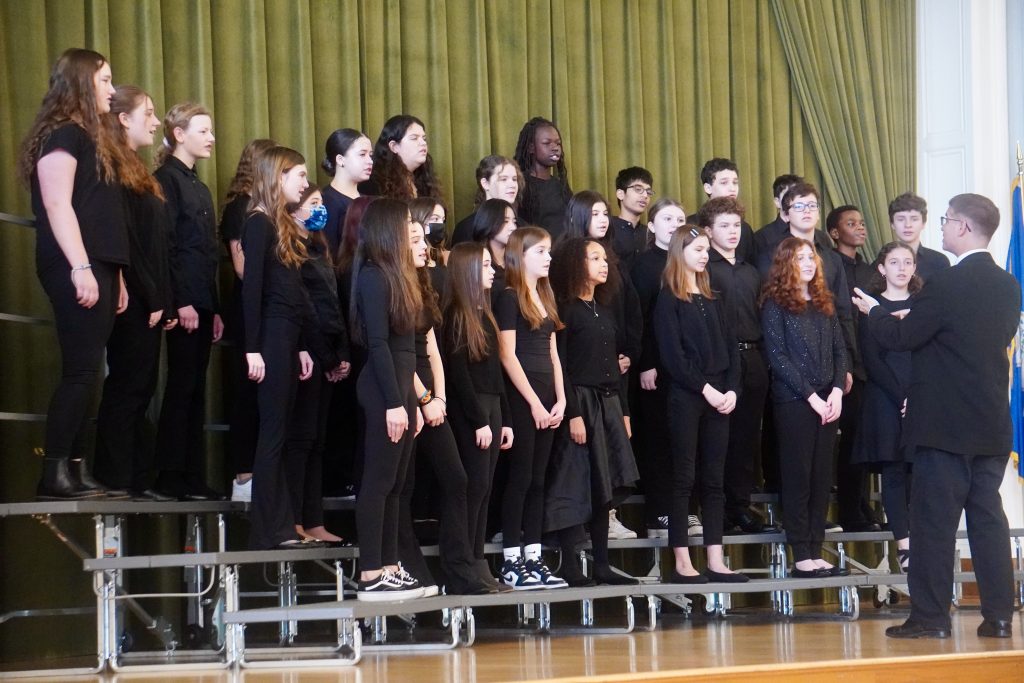
King Philip Middle School Singers perform “The Dream Keeper.” West Hartford 27th celebration of Martin Luther King Day. Jan. 16, 2023. Photo credit: Ronni Newton
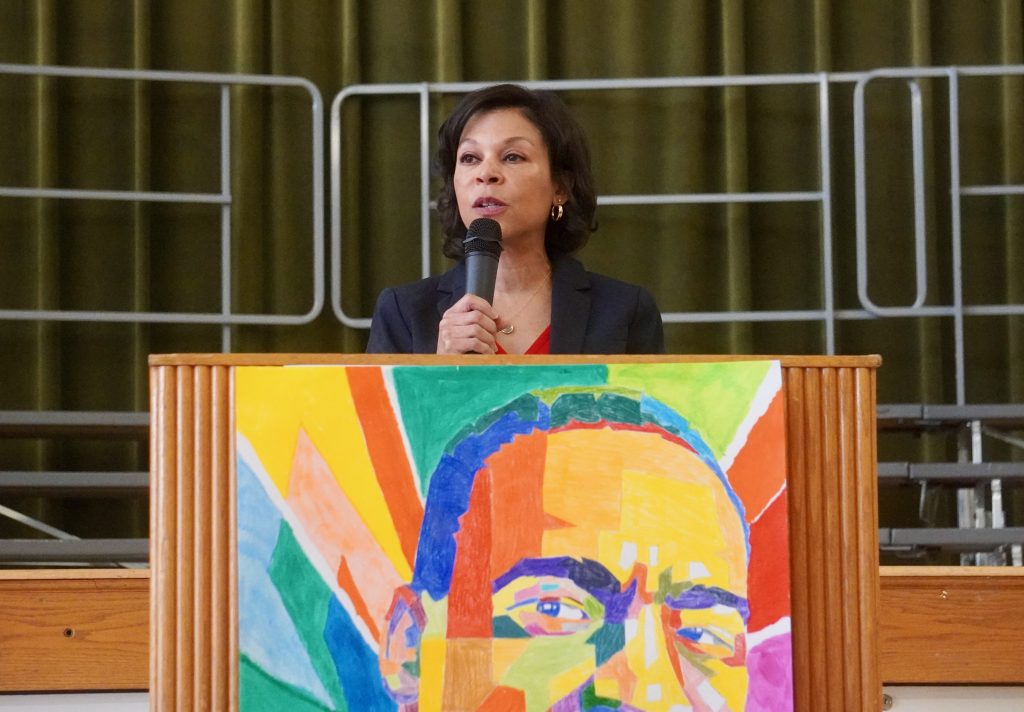
State Rep. Tammy Exum. West Hartford 27th celebration of Martin Luther King Day. Jan. 16, 2023. Photo credit: Ronni Newton
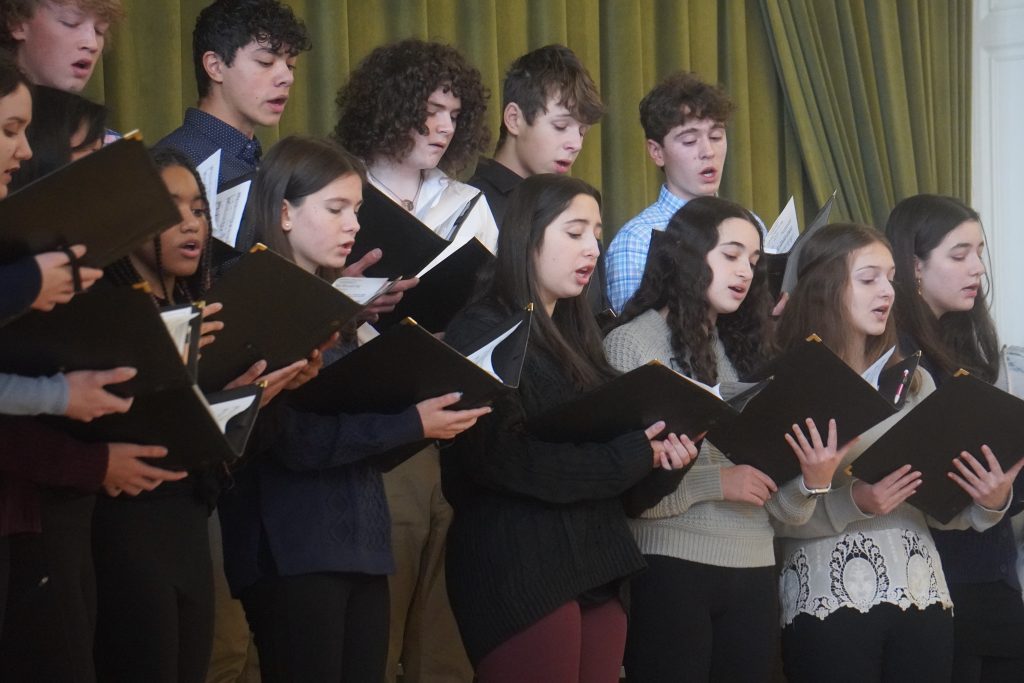
West Hartford 27th celebration of Martin Luther King Day. Jan. 16, 2023. Photo credit: Ronni Newton

A combined group of the Hall Choraliers and the King Philip Middle School Singers led the singing of “We Shall Overcome.” West Hartford 27th celebration of Martin Luther King Day. Jan. 16, 2023. Photo credit: Ronni Newton
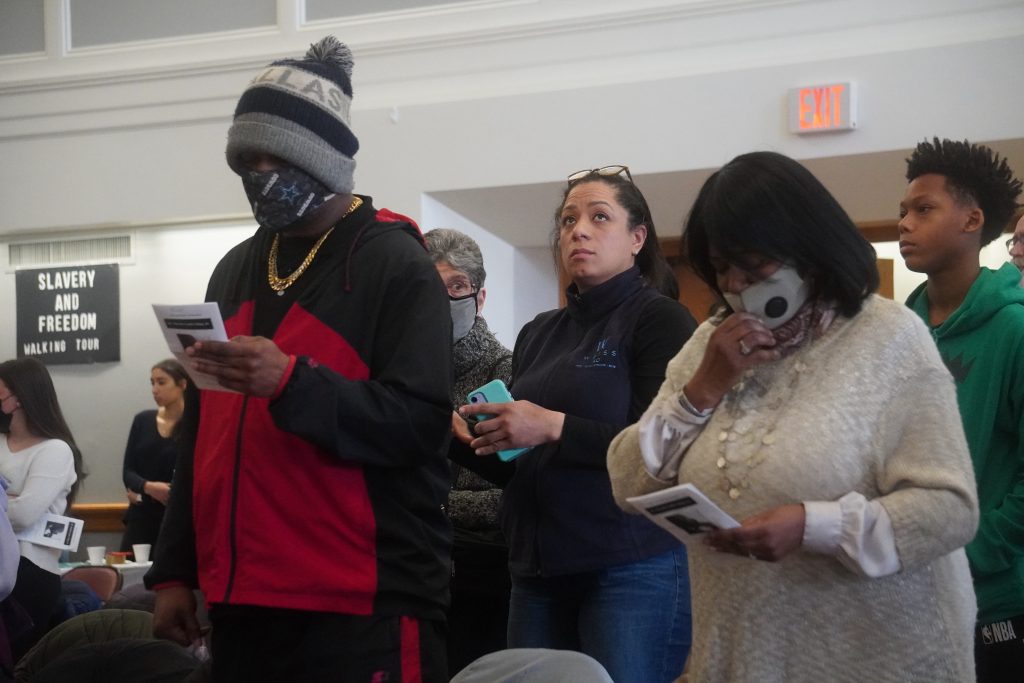
A group sing-a-long of “We Shall Overcome.” West Hartford 27th celebration of Martin Luther King Day. Jan. 16, 2023. Photo credit: Ronni Newton
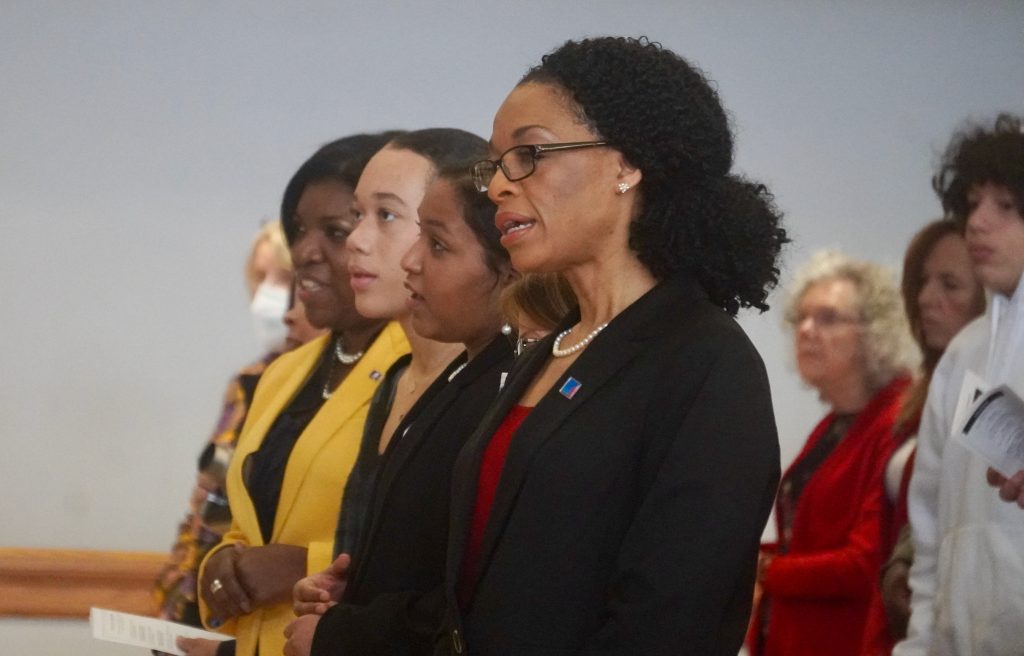
From left: Vanessa Dorantes, Zella Jackson, Afaf Albur, and Lorna Thomas-Farquharson sing “We Shall Overcome.” West Hartford 27th celebration of Martin Luther King Day. Jan. 16, 2023. Photo credit: Ronni Newton
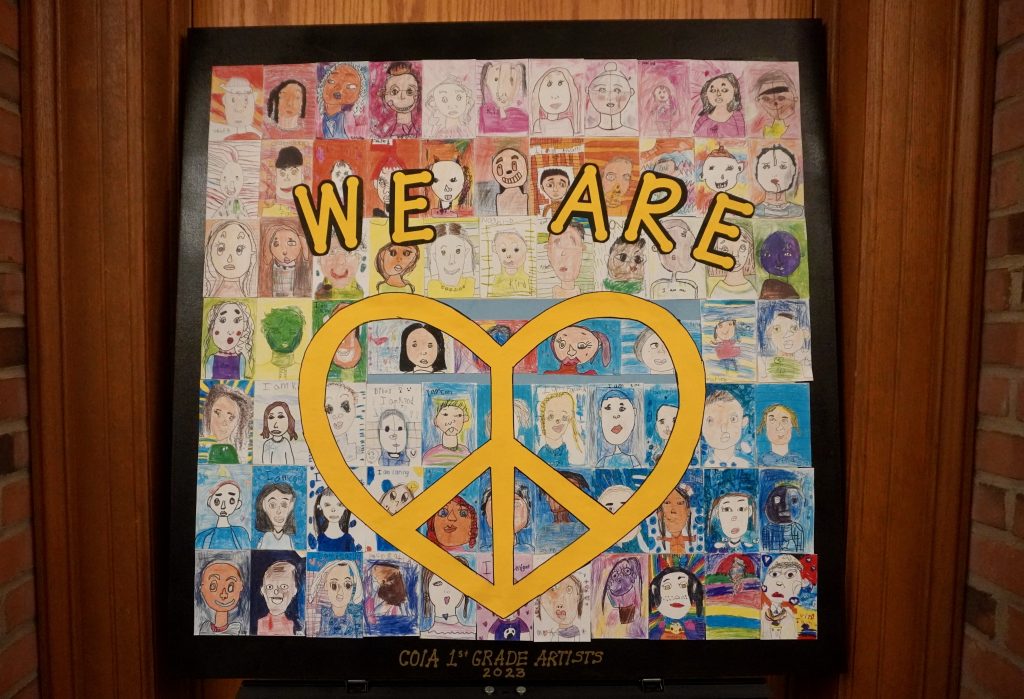
Artwork by West Hartford Public Schools elementary students on display at Town Hall. West Hartford 27th celebration of Martin Luther King Day. Jan. 16, 2023. Photo credit: Ronni Newton
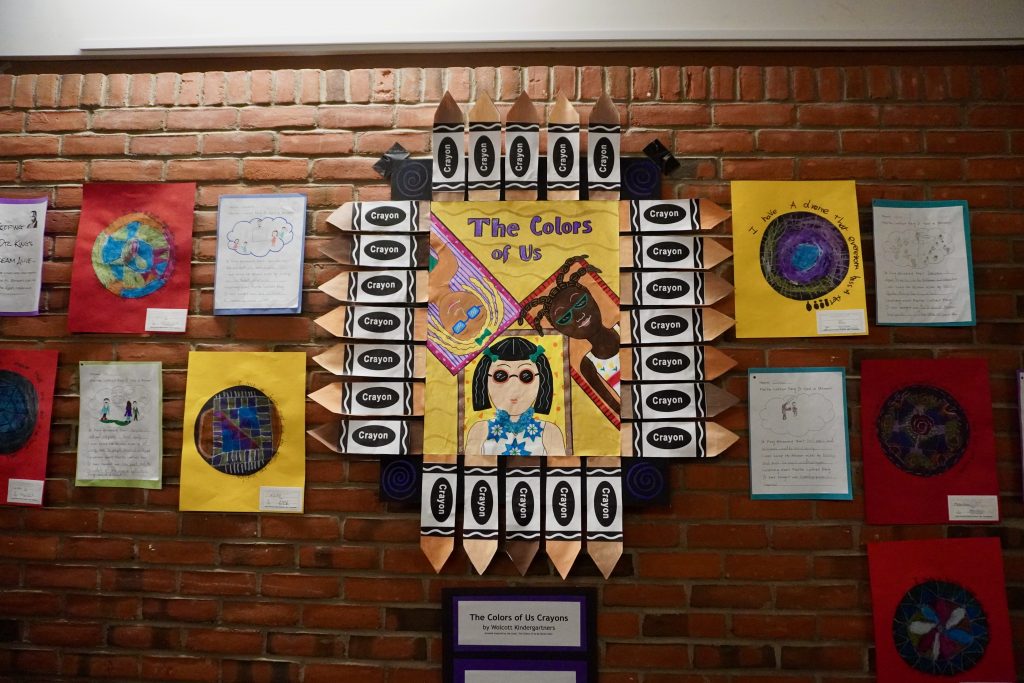
Artwork by West Hartford Public Schools elementary students on display at Town Hall. West Hartford 27th celebration of Martin Luther King Day. Jan. 16, 2023. Photo credit: Ronni Newton
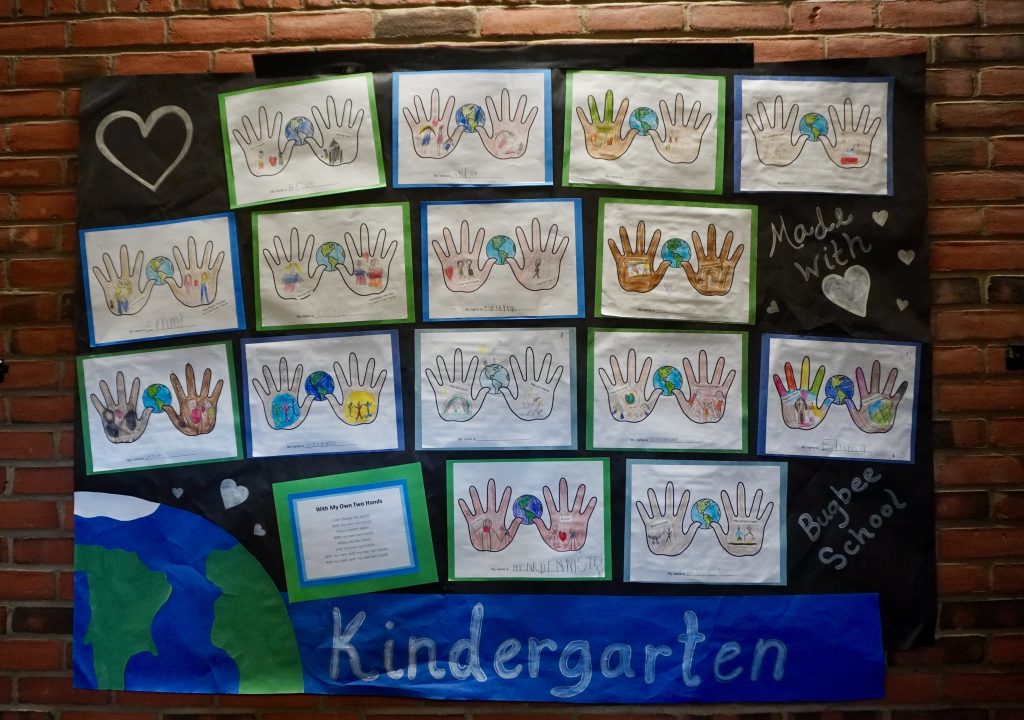
Artwork by West Hartford Public Schools elementary students on display at Town Hall. West Hartford 27th celebration of Martin Luther King Day. Jan. 16, 2023. Photo credit: Ronni Newton
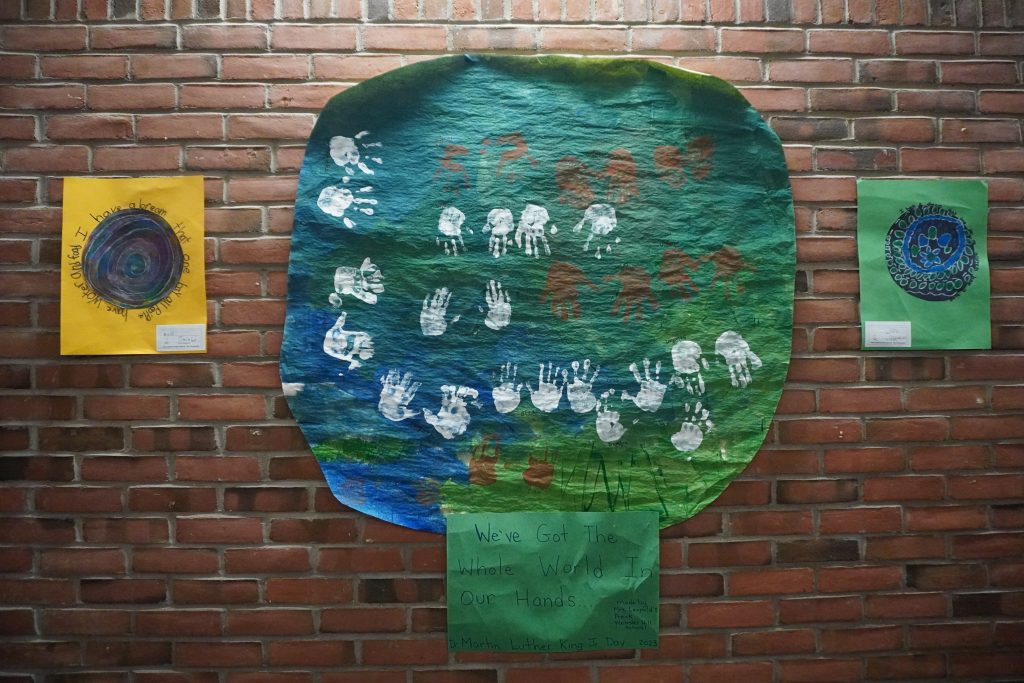
Artwork by West Hartford Public Schools elementary students on display at Town Hall. West Hartford 27th celebration of Martin Luther King Day. Jan. 16, 2023. Photo credit: Ronni Newton
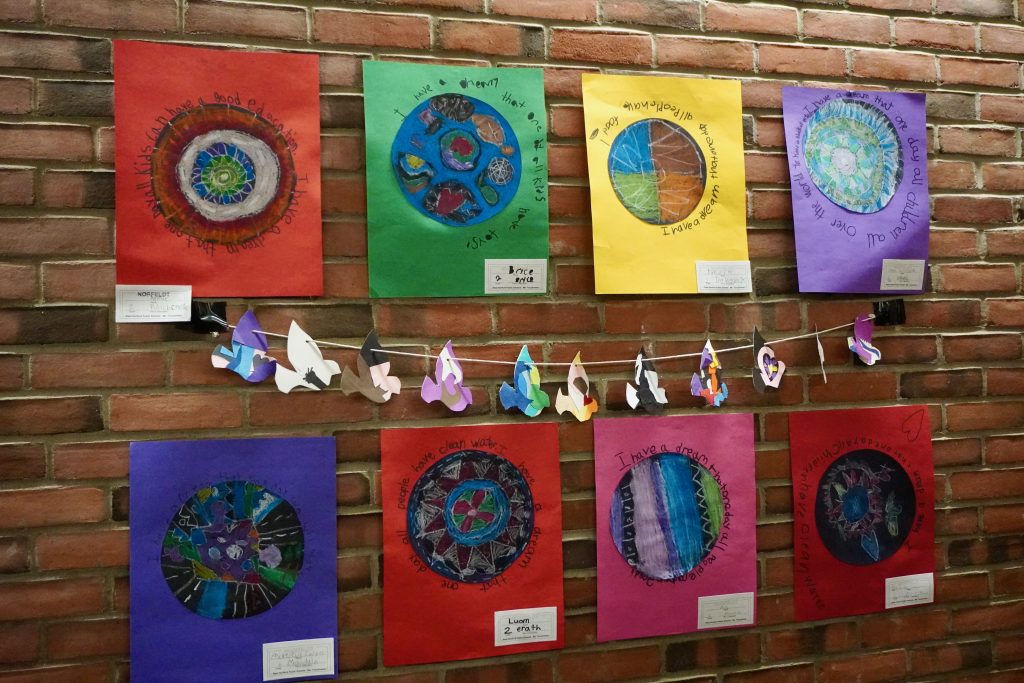
Artwork by West Hartford Public Schools elementary students on display at Town Hall. West Hartford 27th celebration of Martin Luther King Day. Jan. 16, 2023. Photo credit: Ronni Newton
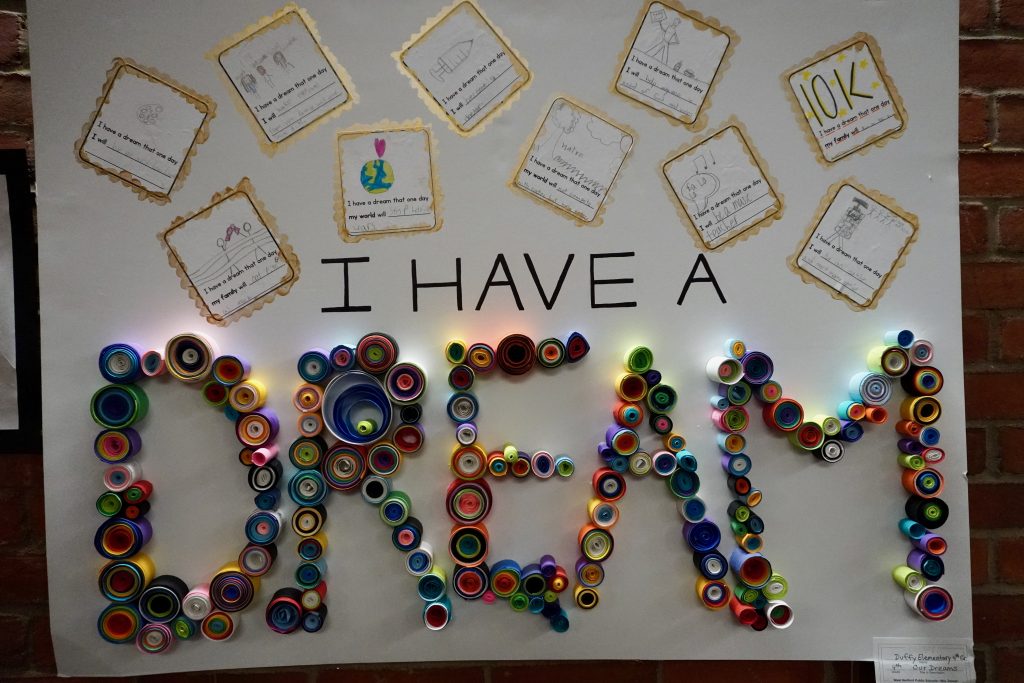
Artwork by West Hartford Public Schools elementary students on display at Town Hall. West Hartford 27th celebration of Martin Luther King Day. Jan. 16, 2023. Photo credit: Ronni Newton
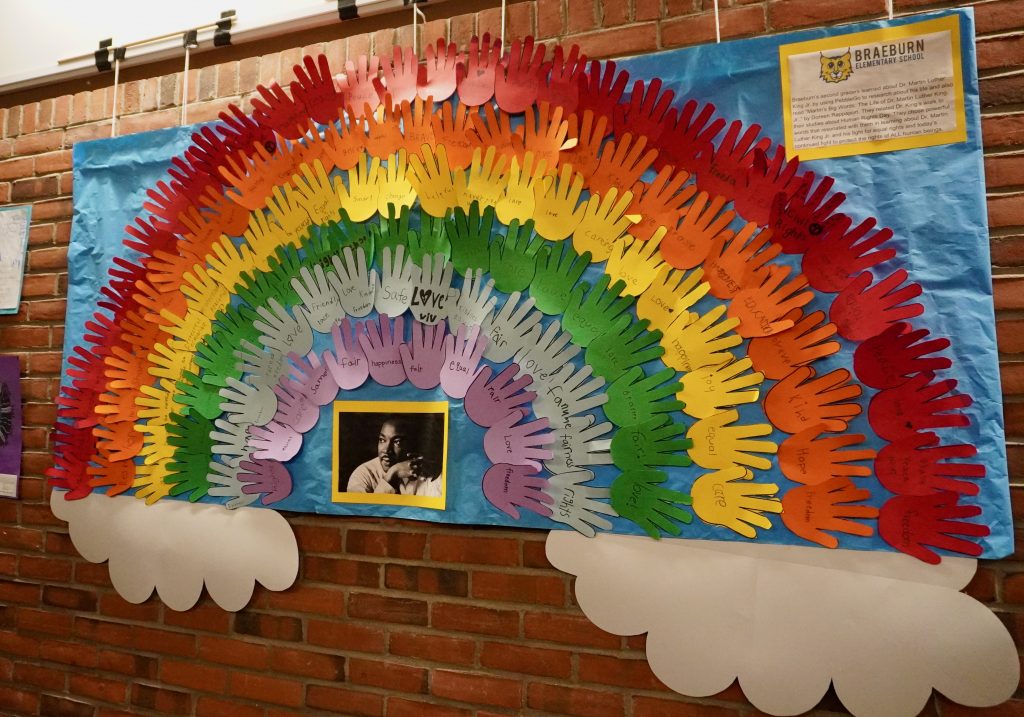
Artwork by West Hartford Public Schools elementary students on display at Town Hall. West Hartford 27th celebration of Martin Luther King Day. Jan. 16, 2023. Photo credit: Ronni Newton
Like what you see here? Click here to subscribe to We-Ha’s newsletter so you’ll always be in the know about what’s happening in West Hartford! Click the blue button below to become a supporter of We-Ha.com and our efforts to continue producing quality journalism.


